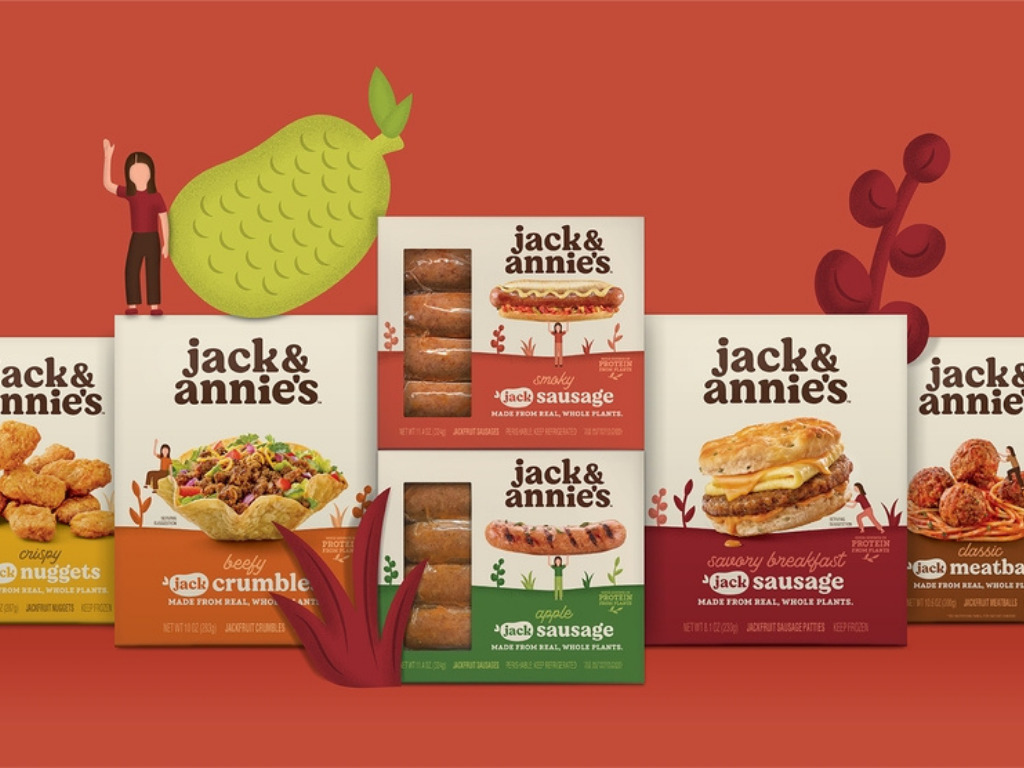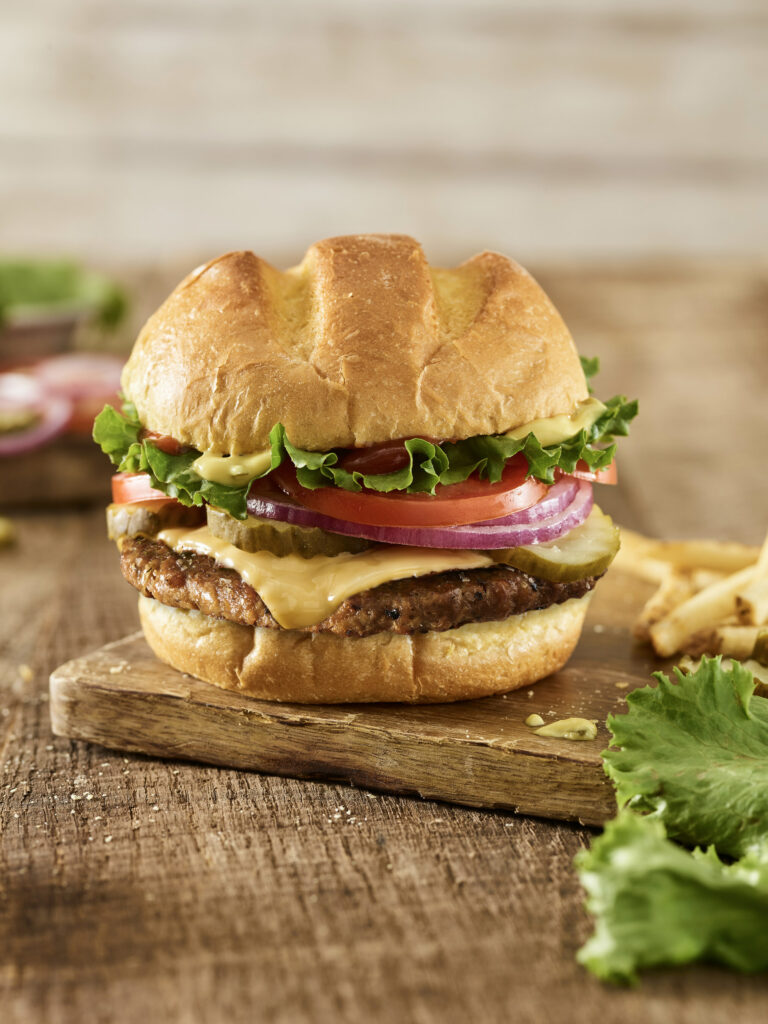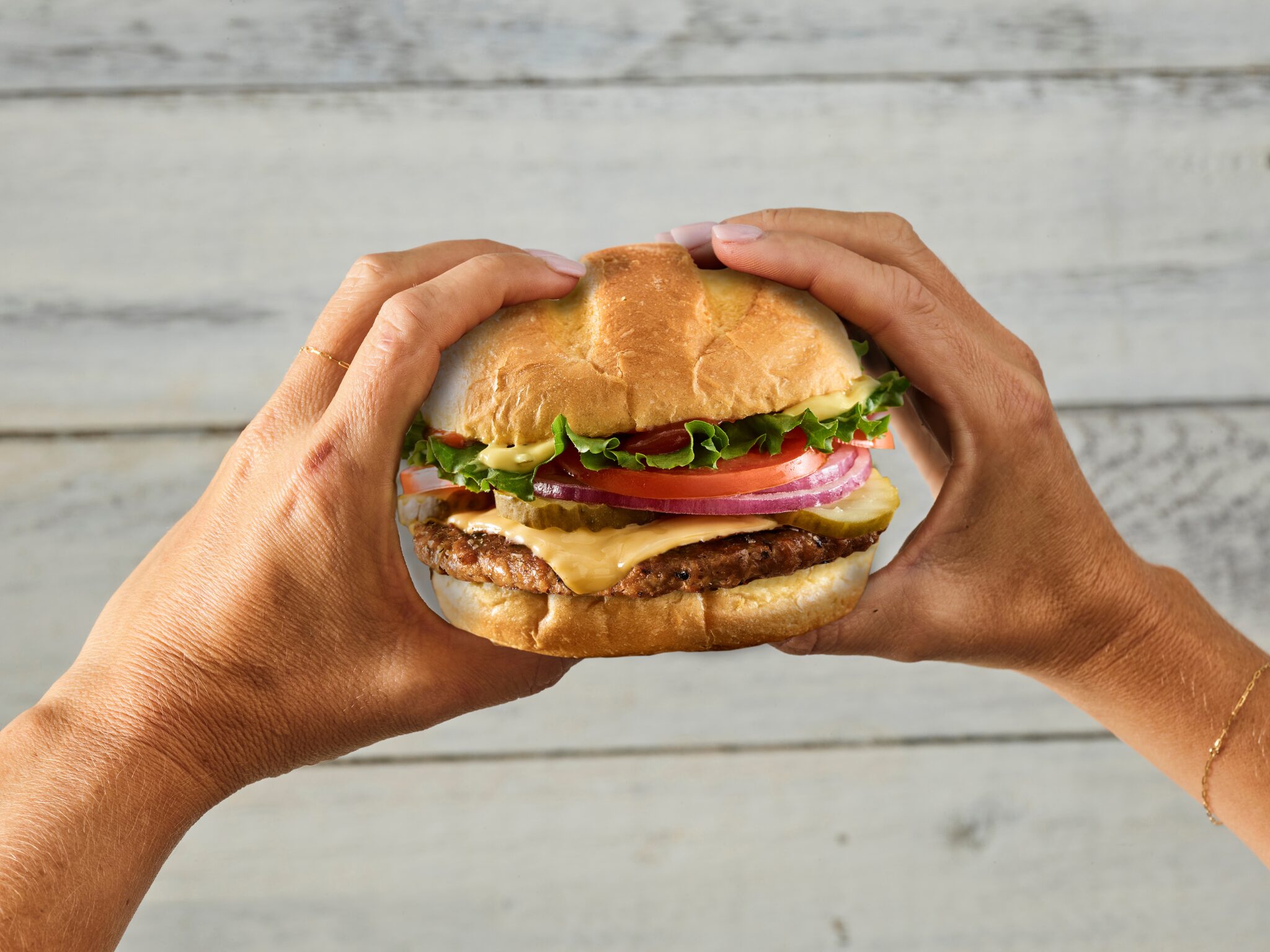Smashburger Jumps on Whole-Food Plant-Based Trend with Jack & Annie’s Jackfruit Burger at All 235 US Locations
5 Mins Read
US fast-casual chain Smashburger has partnered with jackfruit meat producer Jack & Annie’s to debut a new burger across its locations nationwide, the latest example of a QSR embracing whole-food plant-based products.
With health and nutrition top of mind for consumers, whole-food plant-based products have been cropping up across the globe in the foodservice world. In the latest instance, Colorado-based companies Smashburger and Jack & Annie’s have linked up to launch a new burger spotlighting the latter’s jackfruit-based meat.
The collaboration marks the fast-casual debut of Jack & Annie’s – whose products are already available in over 5,000 locations across the US, including Whole Foods, Safeway and Target. Smashburger will add its jackfruit patty as a permanent menu item across its 235 locations nationwide.
“Plant-based alternatives have continued to show up on menus throughout the industry, so making sure we offer more diverse and plant-forward options was the natural transition to expand our menu,” said Smashburger’s chief restaurant support officer, Eric Marcoux.
Keying into health-conscious Americans with jackfruit

Smashburger and Jack & Annie first tested the partnership with a limited-time offering last summer in the chain’s Colorado, New York, New Jersey and Chicago locations. Following positive consumer feedback, it decided to make the jackfruit burger a permanent fixture on its menu nationally.
The burger patty itself is plant-based, but the default Classic Smash Veggie Burger contains American cheese, alongside lettuce, tomatoes, red onions, pickles, Smash Sauce (which isn’t vegan), and ketchup. It is part of a burger range that also includes Truffle Mushroom Swiss and Colorado Veggie burgers, as well as Bacon Smash, BBQ Bacon Cheddar, Avocado Bacon Club burgers (which are not meat-free).
So although the branding makes it seem like these are all veggie burgers, it’s important to note that Smashburger uses conventional bacon. But the jackfruit patty can be subbed in for any chicken, beef or black bean burger on the menu, which could be an appealing option for many health-conscious consumers, given that the Jack & Annie’s burger has 47% less fat than a traditional beef patty.
While not exactly what you’d call an entirely clean-label option – the Jack & Annie’s burger has jackfruit, soy flour, coconut and canola oils, alliums, spices, natural flavourings and colourings, and methylcellulose – it is a whole-food, plant-based meat rich in fibre and micronutrients like potassium, iron and calcium. Moreover, a 100g patty contains 8g of protein, just 9g of total fat (with 5g saturated fat), and 150 calories. Plus, being animal-free, it’s free from cholesterol.
Health is a topic entrenched in the American mainstream consciousness, given the alarming rise in rates of obesity and type 2 diabetes – over two-thirds (69%) of Americans are overweight and 36% are obese. Additionally, there’s greater sensitivity around ultra-processed foods and their impact on health. Last year, research revealed that more Gen Zers in the US want to go vegan for their health than the environment – a key target demographic for Smashburger.
A 1,022-person survey by the International Food Information Council (IFIC) found that health is the major factor behind Americans eating vegan or vegetarian diets, with six in 10 choosing it. In terms of plant-based meat products like Jack & Annie’s, ‘healthy’ is the most appealing labelling description to these consumers.
According to Jack & Annie’s – which has previously been ranked as the third-largest player in the frozen plant-based category – two in three fast-casual customers say a jackfruit-based menu item would make them more likely to purchase from a restaurant. There’s the environmental aspect too: the company’s independent life-cycle assessment has shown that jackfruit’s global warming potential is 94% better than beef, 87% better than pork, and 60% better than chicken.
“With jackfruit, we’ve found a path for consumers that is sustainable, healthier, and provides the tasty experience they are looking for,” said Jack & Annie’s namesake founder and CEO Annie Ryu.
Whole-food plant-based on the up

The IFIC poll also showed that when it comes to protein intake, whole-plant sources saw the sharpest rise among Americans between 2022 and 2023, with 28% eating them ‘somewhat’ or ‘much more’ now. These foods additionally had the second-lowest drop in consumption rates (behind plant-based meat and seafood analogues), with only 11% of consumers eating them less during this period. (In comparison, red meat consumption was down by 32%, and poultry 15%).
It highlights the growing importance of whole-food plant-based options for Americans, with protein choices ranging from tofu and tempeh to jackfruit itself. While Jack & Annie’s isn’t the only company working with jackfruit-based proteins – Karana (Singapore), Jack & Bry (UK) and Upton’s Naturals (US) are among a few others – it is the most well-funded, with $28M in total investments following a $23M Series B round in late 2021 after debuting its products in 2020.
Its partnership with Smashburger signals two opportunities. First, long-standing whole-food plant-based meat brands like Jack & Annie’s parent The Jackfruit Company (which was founded in 2011, the same year as Impossible Foods) might be able to find success with consumers looking for such options. This includes the likes of Upton’s Naturals, NoBull Burger and Big Mountain Foods.
Second, it’s a marker of the growing prevalence of the whole-food plant-based trend in foodservice. Just earlier this year, Dave’s Hot Chicken released its first meat-free options with cauliflower sliders and bites, and Hard Rock Cafe in Broadway introduced a Veganuary menu with cauliflower wings and a mushroom primavera pasta. Chipotle’s braised tofu (Sofritas) and Shake Shack’s veggie burger also come to mind, as does Chipotle founder Steve Ells’ new chain Kernel, whose menu is focused on whole foods too.
This is a trend being seen internationally as well. In the UK, Veganuary saw a whole-food plant-based boom. Burger King brought back its black bean burger, Wagamama and Pret A Manger spotlit mushrooms, Leon went all-in on gut health with a bhaji wrap, while Pizza Express introduced a veggie-packed calzone and Zizzi’s new Rustic pizza featured Fable Foods’ pulled shiitake mushrooms.
With the Smashburger partnership, Jack & Annie’s hopes to make 2024 a significant growth year, and close in on profitability. “We’re excited that consumers across the nation will get to taste what we have known all along: our jackfruit offerings make for delicious and simple plant-based, plant-forward food with naturally meaty taste and texture,” said Ryu. “We are thrilled to move the plant-based category forward.”



